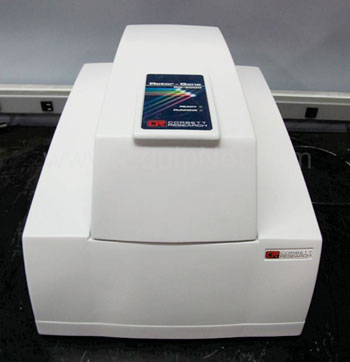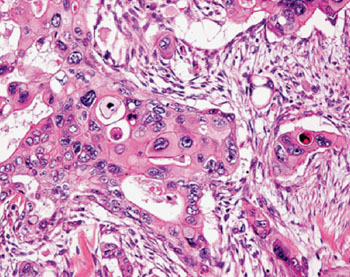Gene Mutation Found for Aggressive Form of Pancreatic Cancer
|
By LabMedica International staff writers Posted on 04 Jun 2014 |

Image: The RotorGene RG-3000 thermal cycler system (Photo courtesy of Corbett Research).

Image: Photomicrograph of pancreatic adenosquamous carcinoma (Photo courtesy of Ralph H Hruban and Noriyoshi Fukushima).
A mutated gene common to adenosquamous carcinoma tumors has been discovered and is the first known unique molecular signature for this rare, but particularly virulent, form of pancreatic cancer.
Pancreatic adenosquamous carcinoma (ASC) is an enigmatic and aggressive tumor that has a worse prognosis and higher metastatic potential than its adenocarcinoma counterpart. There has been little progress in understanding pancreatic ASC, as no mutations unique to this class of pancreatic tumors have been identified.
Scientists at the University of California, San Diego School of Medicine (La Jolla, CA, USA) and an international team evaluated a set of tumors and corresponding normal tissues from 23 patients with ASC of the pancreas, as well as tumors from 24 patients with ductal adenocarcinoma, three patients with solid pseudopapillary neoplasm, two patients with neuroendocrine carcinoma and 21 patients with lung squamous cell carcinoma. Of the 23 ASC patient specimens, there were 19 formalin-fixed, paraffin-embedded (FFPE) tissue sections available. The other four ASC patient specimens were frozen immediately after collection.
Genomic DNA from the frozen samples was extracted using the DNeasy Blood & Tissue Kit (Qiagen; Valencia, CA, USA) and genomic DNA from the FFPE samples was extracted using Qiagen’s QIAamp DNA FFPE Tissue Kit. Quantitative real-time reverse-transcription PCR (RT-qPCR) analysis was performed using the relative quantification method in a RotorGene RG-3000 thermal cycler system (Corbett Research; Mortlake, NSW, Australia).
The investigators found that that ASC pancreatic tumors have somatic or non-heritable mutations in the Up-frameshift 1 (UPF1) gene, which is involved in a highly conserved RNA degradation pathway called nonsense-mediated RNA decay or NMD. It is the first known example of genetic alterations in an NMD gene in human tumors. NMD has two major roles. First, it is a quality control mechanism used by cells to eliminate faulty messenger RNA (mRNA). Second, it degrades a specific group of normal mRNAs, including those encoding proteins promoting cell growth, cell migration and cell survival.
Miles F. Wilkinson, PhD, co-senior author, said, “There has been little progress in understanding pancreatic ASC since these aggressive tumors were first described more than a century ago. One problem has been identifying mutations unique to this class of tumors.” The study was published on May 25, 2014, in the journal Nature Medicine.
Related Links:
University of California, San Diego School of Medicine
Qiagen
Corbett Research
Pancreatic adenosquamous carcinoma (ASC) is an enigmatic and aggressive tumor that has a worse prognosis and higher metastatic potential than its adenocarcinoma counterpart. There has been little progress in understanding pancreatic ASC, as no mutations unique to this class of pancreatic tumors have been identified.
Scientists at the University of California, San Diego School of Medicine (La Jolla, CA, USA) and an international team evaluated a set of tumors and corresponding normal tissues from 23 patients with ASC of the pancreas, as well as tumors from 24 patients with ductal adenocarcinoma, three patients with solid pseudopapillary neoplasm, two patients with neuroendocrine carcinoma and 21 patients with lung squamous cell carcinoma. Of the 23 ASC patient specimens, there were 19 formalin-fixed, paraffin-embedded (FFPE) tissue sections available. The other four ASC patient specimens were frozen immediately after collection.
Genomic DNA from the frozen samples was extracted using the DNeasy Blood & Tissue Kit (Qiagen; Valencia, CA, USA) and genomic DNA from the FFPE samples was extracted using Qiagen’s QIAamp DNA FFPE Tissue Kit. Quantitative real-time reverse-transcription PCR (RT-qPCR) analysis was performed using the relative quantification method in a RotorGene RG-3000 thermal cycler system (Corbett Research; Mortlake, NSW, Australia).
The investigators found that that ASC pancreatic tumors have somatic or non-heritable mutations in the Up-frameshift 1 (UPF1) gene, which is involved in a highly conserved RNA degradation pathway called nonsense-mediated RNA decay or NMD. It is the first known example of genetic alterations in an NMD gene in human tumors. NMD has two major roles. First, it is a quality control mechanism used by cells to eliminate faulty messenger RNA (mRNA). Second, it degrades a specific group of normal mRNAs, including those encoding proteins promoting cell growth, cell migration and cell survival.
Miles F. Wilkinson, PhD, co-senior author, said, “There has been little progress in understanding pancreatic ASC since these aggressive tumors were first described more than a century ago. One problem has been identifying mutations unique to this class of tumors.” The study was published on May 25, 2014, in the journal Nature Medicine.
Related Links:
University of California, San Diego School of Medicine
Qiagen
Corbett Research
Latest Pathology News
- AI Integrated With Optical Imaging Technology Enables Rapid Intraoperative Diagnosis
- HPV Self-Collection Solution Improves Access to Cervical Cancer Testing
- Hyperspectral Dark-Field Microscopy Enables Rapid and Accurate Identification of Cancerous Tissues
- AI Advancements Enable Leap into 3D Pathology
- New Blood Test Device Modeled on Leeches to Help Diagnose Malaria
- Robotic Blood Drawing Device to Revolutionize Sample Collection for Diagnostic Testing
- Use of DICOM Images for Pathology Diagnostics Marks Significant Step towards Standardization
- First of Its Kind Universal Tool to Revolutionize Sample Collection for Diagnostic Tests
- AI-Powered Digital Imaging System to Revolutionize Cancer Diagnosis
- New Mycobacterium Tuberculosis Panel to Support Real-Time Surveillance and Combat Antimicrobial Resistance
- New Method Offers Sustainable Approach to Universal Metabolic Cancer Diagnosis
- Spatial Tissue Analysis Identifies Patterns Associated With Ovarian Cancer Relapse
- Unique Hand-Warming Technology Supports High-Quality Fingertip Blood Sample Collection
- Image-Based AI Shows Promise for Parasite Detection in Digitized Stool Samples
- Deep Learning Powered AI Algorithms Improve Skin Cancer Diagnostic Accuracy
- Microfluidic Device for Cancer Detection Precisely Separates Tumor Entities
Channels
Clinical Chemistry
view channel
3D Printed Point-Of-Care Mass Spectrometer Outperforms State-Of-The-Art Models
Mass spectrometry is a precise technique for identifying the chemical components of a sample and has significant potential for monitoring chronic illness health states, such as measuring hormone levels... Read more.jpg)
POC Biomedical Test Spins Water Droplet Using Sound Waves for Cancer Detection
Exosomes, tiny cellular bioparticles carrying a specific set of proteins, lipids, and genetic materials, play a crucial role in cell communication and hold promise for non-invasive diagnostics.... Read more
Highly Reliable Cell-Based Assay Enables Accurate Diagnosis of Endocrine Diseases
The conventional methods for measuring free cortisol, the body's stress hormone, from blood or saliva are quite demanding and require sample processing. The most common method, therefore, involves collecting... Read moreHematology
view channel
Next Generation Instrument Screens for Hemoglobin Disorders in Newborns
Hemoglobinopathies, the most widespread inherited conditions globally, affect about 7% of the population as carriers, with 2.7% of newborns being born with these conditions. The spectrum of clinical manifestations... Read more
First 4-in-1 Nucleic Acid Test for Arbovirus Screening to Reduce Risk of Transfusion-Transmitted Infections
Arboviruses represent an emerging global health threat, exacerbated by climate change and increased international travel that is facilitating their spread across new regions. Chikungunya, dengue, West... Read more
POC Finger-Prick Blood Test Determines Risk of Neutropenic Sepsis in Patients Undergoing Chemotherapy
Neutropenia, a decrease in neutrophils (a type of white blood cell crucial for fighting infections), is a frequent side effect of certain cancer treatments. This condition elevates the risk of infections,... Read more
First Affordable and Rapid Test for Beta Thalassemia Demonstrates 99% Diagnostic Accuracy
Hemoglobin disorders rank as some of the most prevalent monogenic diseases globally. Among various hemoglobin disorders, beta thalassemia, a hereditary blood disorder, affects about 1.5% of the world's... Read moreImmunology
view channel.jpg)
AI Predicts Tumor-Killing Cells with High Accuracy
Cellular immunotherapy involves extracting immune cells from a patient's tumor, potentially enhancing their cancer-fighting capabilities through engineering, and then expanding and reintroducing them into the body.... Read more
Diagnostic Blood Test for Cellular Rejection after Organ Transplant Could Replace Surgical Biopsies
Transplanted organs constantly face the risk of being rejected by the recipient's immune system which differentiates self from non-self using T cells and B cells. T cells are commonly associated with acute... Read more
AI Tool Precisely Matches Cancer Drugs to Patients Using Information from Each Tumor Cell
Current strategies for matching cancer patients with specific treatments often depend on bulk sequencing of tumor DNA and RNA, which provides an average profile from all cells within a tumor sample.... Read more
Genetic Testing Combined With Personalized Drug Screening On Tumor Samples to Revolutionize Cancer Treatment
Cancer treatment typically adheres to a standard of care—established, statistically validated regimens that are effective for the majority of patients. However, the disease’s inherent variability means... Read moreMicrobiology
view channel
Integrated Solution Ushers New Era of Automated Tuberculosis Testing
Tuberculosis (TB) is responsible for 1.3 million deaths every year, positioning it as one of the top killers globally due to a single infectious agent. In 2022, around 10.6 million people were diagnosed... Read more
Automated Sepsis Test System Enables Rapid Diagnosis for Patients with Severe Bloodstream Infections
Sepsis affects up to 50 million people globally each year, with bacteraemia, formerly known as blood poisoning, being a major cause. In the United States alone, approximately two million individuals are... Read moreEnhanced Rapid Syndromic Molecular Diagnostic Solution Detects Broad Range of Infectious Diseases
GenMark Diagnostics (Carlsbad, CA, USA), a member of the Roche Group (Basel, Switzerland), has rebranded its ePlex® system as the cobas eplex system. This rebranding under the globally renowned cobas name... Read more
Clinical Decision Support Software a Game-Changer in Antimicrobial Resistance Battle
Antimicrobial resistance (AMR) is a serious global public health concern that claims millions of lives every year. It primarily results from the inappropriate and excessive use of antibiotics, which reduces... Read morePathology
view channel
AI Integrated With Optical Imaging Technology Enables Rapid Intraoperative Diagnosis
Rapid and accurate intraoperative diagnosis is essential for tumor surgery as it guides surgical decisions with precision. Traditional intraoperative assessments, such as frozen sections based on H&E... Read more
HPV Self-Collection Solution Improves Access to Cervical Cancer Testing
Annually, over 604,000 women across the world are diagnosed with cervical cancer, and about 342,000 die from this disease, which is preventable and primarily caused by the Human Papillomavirus (HPV).... Read moreHyperspectral Dark-Field Microscopy Enables Rapid and Accurate Identification of Cancerous Tissues
Breast cancer remains a major cause of cancer-related mortality among women. Breast-conserving surgery (BCS), also known as lumpectomy, is the removal of the cancerous lump and a small margin of surrounding tissue.... Read moreTechnology
view channel
New Diagnostic System Achieves PCR Testing Accuracy
While PCR tests are the gold standard of accuracy for virology testing, they come with limitations such as complexity, the need for skilled lab operators, and longer result times. They also require complex... Read more
DNA Biosensor Enables Early Diagnosis of Cervical Cancer
Molybdenum disulfide (MoS2), recognized for its potential to form two-dimensional nanosheets like graphene, is a material that's increasingly catching the eye of the scientific community.... Read more
Self-Heating Microfluidic Devices Can Detect Diseases in Tiny Blood or Fluid Samples
Microfluidics, which are miniature devices that control the flow of liquids and facilitate chemical reactions, play a key role in disease detection from small samples of blood or other fluids.... Read more
Breakthrough in Diagnostic Technology Could Make On-The-Spot Testing Widely Accessible
Home testing gained significant importance during the COVID-19 pandemic, yet the availability of rapid tests is limited, and most of them can only drive one liquid across the strip, leading to continued... Read moreIndustry
view channel
Danaher and Johns Hopkins University Collaborate to Improve Neurological Diagnosis
Unlike severe traumatic brain injury (TBI), mild TBI often does not show clear correlations with abnormalities detected through head computed tomography (CT) scans. Consequently, there is a pressing need... Read more
Beckman Coulter and MeMed Expand Host Immune Response Diagnostics Partnership
Beckman Coulter Diagnostics (Brea, CA, USA) and MeMed BV (Haifa, Israel) have expanded their host immune response diagnostics partnership. Beckman Coulter is now an authorized distributor of the MeMed... Read more_1.jpg)













